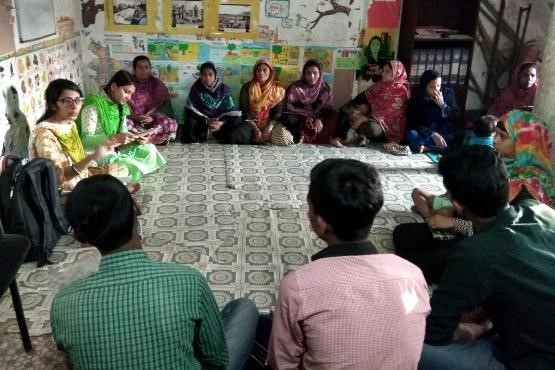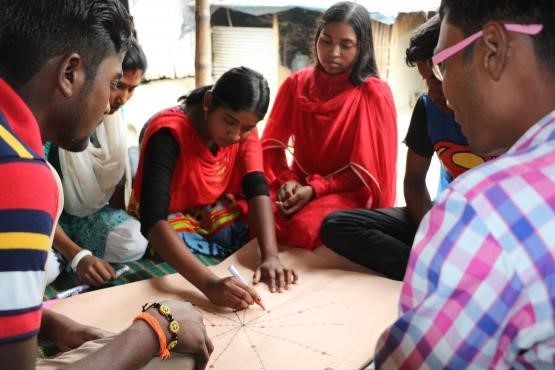

Ever since its launch in 2015, the Sustainable Development Goals (SDGs) have become this new buzzword across the world. Even more so, in the development sector. The guidelines to this generation’s moon shot- the SDGs state that participation across all sectors- government, private and the community, is critically essential in reaching the SDGs by 2030. The government of Bangladesh submitted a VNR on the progress of SDGs in 2017, and as development practitioners, we are keen on supplementing these efforts.
Over the past years, different perception surveys and discussions with young people in Bangladesh between 15-30 years have repeatedly stated improved access to quality education and healthcare, increased access to skills development and employment opportunities, accountable and responsive institutions, and equality between women and men as their priorities.
As world leaders are meeting in New York for the HLPF 2018, ActionAid Bangladesh together with Activista Bangladesh and Global Platform Bangladeshparticipated in a multi-country research to find out the experiences and demands of young people in terms of youth employment opportunities, gender equity and accountability of the government services since the adoption of SDGs in Bangladesh. This was an attempt to listen to the voices of the marginalised communities on the implementation of SDG 5 on gender equality, SDG 8 on youth employment and decent work, and SDG 16 on accountability and participation, corruption and non-discrimination.
In the rounds of focus group discussions and interviews that were conducted, youth voices shared their wide-ranging experiences on economic marginalisation faced by young people due to lack of skills and matching livelihood opportunities. They demanded for initiatives that will ensure more skills development and sustainable livelihood opportunities for young people in the country – including more contextualised, targeted and inclusive vocational trainings, investment in entrepreneurs or cooperatives, and enforcement of quotas and targets within existing laws. In stating so, they also demanded strengthening of institutional responses to violence against women alongside safer transport facilities, initiatives to promote more transparency and engagement of citizens’ voices in policymaking, simultaneously.

“A certificate definitely helps in getting a job, but seed funds can help us create our own opportunities” – Young focus group participant, Bangladesh.
Similar to the other participating countries, young citizens from all the regions of Bangladesh stated the need for more access to technical and vocational trainings. Participants from the focus groups in Satkhira, Chittagong, Nilphamari and Bagerhat discussed that while some skills development opportunities do exist at district and upazila levels, they are often insufficient in numbers, and information about these opportunities do not reach marginalised communities and people living in remote areas.
In the discussions at Satkhira, Bangladesh, the focus groups identified the lack of street lights as one of the key problems enabling incidents of violence in the area that makes it dangerous for women to travel/work outside after dark; thus, restricting them from seeking employment opportunities. The young women participants from other districts too stated similar feelings and they wanted this to change.
Young respondents of Chittagong, Bangladesh shared how the presence of a drug-selling market in the community restricts women’s movement in the afternoon only. They demanded more attention be paid in ensuring roads and workplaces are violence-free, with safer transport facilities to workplaces in remote locations, as drug addiction and abuse has become a major security concern for all, especially the young people
In addition, during the discussion sessions, some of the participants further demanded for transparency and accountability of the government institutions- implementation of existing policies and accountability of implementers, sanctions on leaders who break the rules, and transparency in resource allocation and distribution.

“If the authorities come and walk shoulder to shoulder, they can hear the voices of the individuals …Individuals have their own opinions, by connecting with them loopholes can be identified and solved.”–
-Poly Aktar, Bagherat, Bangladesh
It is obvious that in all countries, some groups are left behind. If we look at young people as a community, we see that not only are they left behind, but they know it. They have solutions and demands. But in the regular course of things, their voices do not get heard as they lack the chance to articulate them, or to be included in decision-making processes. This is what leaves them behind.
It is quite evident that currently, essential public services are often insufficient in meeting the needs of young people in the context of developing countries; partly because of the way democratic participation is designed, and partly because the accountability mechanisms need to be stronger.
Young people are keen on contributing to their own development. However, they can only go part of the way on their own. They acknowledge and rely on the government-led policies to provide these youth-responsive public services that can benefit everyone in reaching the SDGs.